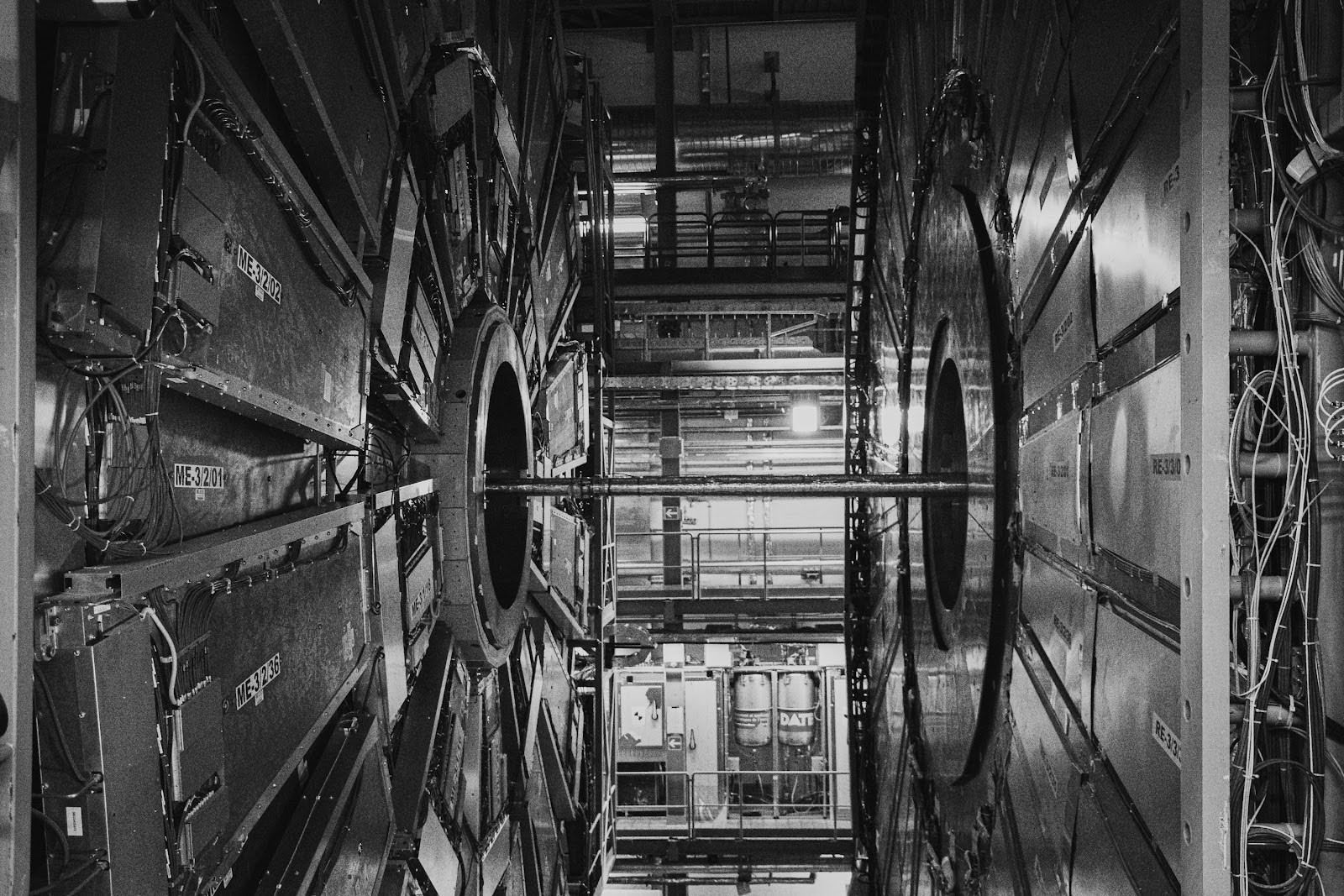Mathematics has never been so employable. As we move through 2025, employers in fundamental research, deep‑tech start‑ups and high‑finance are all competing for the same pool of highly numerate graduates. Whether your dream is to work on the Large Hadron Collider at CERN or to build volatility models in Canary Wharf, this guide sets out the most promising maths‑led careers, the pathways that lead to them, and what you can realistically earn over the next decade.

Photo by Antonio Vivace on Unsplash
The 2025 maths job market at a glance
Demand for advanced quantitative skills is being driven by three converging forces: booming investment in artificial intelligence, the acceleration of climate‑risk modelling, and a renaissance in big‑science infrastructure. UK job adverts that specify “strong mathematical background” rose by 18 % year‑on‑year in the six months to April 2025, according to ITJobsWatch. At the same time, Europe’s flagship laboratories—CERN, ESA and the Alan Turing Institute—have expanded their early‑career fellowship head‑counts, signalling an unusually favourable window for new entrants.
High‑impact career paths
- Data Scientist / Machine‑Learning Researcher
Once a Silicon‑Valley niche, data science is now the default quantitative role across healthcare, retail and even Whitehall. The average UK data‑scientist base salary in 2025 is roughly US $67 254 (£52 000) with total packages edging towards £62 000 for candidates who can demonstrate production‑level Python and statistics. Expect steady 6–8 % annual growth in pay as AI regulations force firms to employ mathematically literate “model stewards”. - Quantitative Analyst (Quant)
Investment banks and hedge‑funds continue to pay a premium for stochastic‑calculus expertise. The typical quant in London now earns £78 000 base, with total compensation frequently nudging £100 000–£120 000 thanks to bonuses. A PhD in a hard‑science is still common, but MSc graduates with exceptional coding tests can enter directly through graduate trading programmes. - Cryptographer & Cyber‑Security Mathematician
Post‑quantum encryption and the proliferation of zero‑knowledge proofs have put number theory back in fashion. Median UK pay for a cryptographer stands at £59 526, with specialist engineers at blue‑chip tech firms commanding north of £75 000. Employers value algebraic geometry, lattice‑based cryptography and Rust/C++ fluency. - Climate & Environmental Modeller
The Met Office, consultancy giants and insurance underwriters all hire mathematicians to build high‑resolution climate models. Statistical scientists entering the Met Office’s 2025 cohort start around £33 794, rising to packages of £46 658 for mid‑career specialists in extreme‑weather analytics. Salaries may feel modest versus finance, but the field offers rapid publication, policy impact and generous public‑sector pensions. - Mathematical Physicist at CERN and other Big‑Science Facilities
For pure maths graduates who crave the frontier of human knowledge, CERN remains the gold standard. Entry‑level fellows with a recent PhD earn CHF 6 828–7 239 per month tax‑free (≈£66 000–70 000 per year), while experienced staff scientists start at CHF 10 715 (£98 000) net CERN Carrières. Comparable opportunities exist at the European Spallation Source and ESA’s ESTEC campus, albeit with slightly lower pay.
Pathways into prestigious labs
CERN offers three structured routes for mathematicians:
- Summer Student Programme: nine weeks in Geneva for BSc/MSc students who have finished at least six semesters; applications close in late January each year.
- Technical Studentship—IT, Mathematics & Robotics: six‑ to twelve‑month placements ideal for sandwich‑year undergraduates; selection interviews emphasise C++ and statistical inference skills.
- Graduate/Fellowship Track: open to MSc holders (Early‑Career Graduate) and fresh PhDs (Research Fellow). A strong publication record, evidence of collaborative coding and glowing referee reports are decisive; your CV should quantify exactly how your algorithms improved detector‑calibration or data‑throughput.
The Alan Turing Institute in London recruits Research Software Engineers (RSEs) and Fellows on contracts paying £37 000–£75 732, depending on seniority. Successful candidates often come through doctoral training centres or the Institute’s Enrichment Scheme, which lets PhD students embed for up to 12 months while retaining university registration.
Commercial research labs such as DeepMind and Amazon’s Post‑Quantum Crypto group typically run annual “Residency” intakes. Although exact salaries are opaque, anecdotal reports suggest total packages starting around £120 000, blending salary, stock units and sign‑on bonuses—illustrating how tech continues to out‑bid academia for scarce theoretical talent.
Qualifications that matter
| Career | Typical minimum qualification | Desirable extras |
| Data Scientist | BSc Mathematics/Statistics with Python/R | Kaggle medals, published reproducible code |
| Quant Analyst | MSc Financial Maths or Physics | PhD + C++/Rust, experience in high‑frequency trading |
| Cryptographer | MSc Computer Security / Pure Maths | Coursework in lattice cryptography, open‑source contributions |
| Climate Modeller | MSc Applied Maths / Meteorology | Knowledge of Fortran or Julia, HPC experience |
| CERN Fellow | PhD Theoretical Physics / Maths | Peer‑reviewed papers, CERN summer student alumnus |
Salary trajectories and long‑term evolution
- Data Science: entry‑level £42 000 → £95 000+ by year 10 as “Principal Data Scientist”; equity in scale‑ups can push total rewards higher.
- Quant Finance: steep ramp—double compensation by year 5 if performance is strong; senior desk heads earn £250 000–£400 000 base plus variable pay.
- Cryptography: niche scarcity fuels 8–10 % annual rises; post‑quantum skills could command premiums once NIST finalises new standards (expected 2026).
- Climate Modelling: slower but stable progression; senior scientific officers plateau around £65 000, but secondments to the European Centre for Medium‑Range Weather Forecasts attract international allowances.
- Big‑Science Researcher: CERN’s salary grid adjusts annually with Swiss inflation; moving from Fellow to Grade 6 staff can lift pay by ~30 %. Many alumni segue into high‑tech leadership or professorships where pay bands are higher but less tax‑advantaged.
Soft skills and networking
However brilliant your algebra, hiring managers still prize soft skills. Clear technical writing, open‑source etiquette and an ability to communicate uncertainty to non‑experts all differentiate short‑listed candidates. Attend conferences (e.g. NeurIPS, QuantMinds, European Geosciences Union) and volunteer for poster sessions; many CERN offers originate from informal chats in the exhibitors’ hall.
Professional bodies such as the Institute of Mathematics and its Applications (IMA) and the London Mathematical Society also run mentoring circles and grant schemes that fund travel to Geneva, Paris‑Saclay or Oxford’s Mathematical Institute. Membership fees are modest and signal commitment on an early‑career CV.
Looking ahead: 2025‑2030
Mathematics careers are set to widen rather than narrow. Quantum‑computing start‑ups will require algebraic‑number theorists; sovereign wealth funds want actuarial quants to stress‑test green‑bond portfolios; and ESA’s 2030 Lunar Gateway timeline is already triggering recruitment of orbital‑mechanics modellers. Flexibility, life‑long learning and comfort with interdisciplinary teams will decide who ascends from solid contributor to field‑shaping leader.
In short, 2025 is an auspicious year to be a mathematician. Whether your passion lies beneath the Alps at CERN, in London’s trading floors or in code that secures the post‑quantum internet, the pathways are clearer than ever: earn a rigorous degree, seek out competitive student programmes, cultivate a results‑focused portfolio, and present it all in a crisp, evidence‑rich CV. With those pieces in place, the numbers will take care of themselves—and so will your career.
